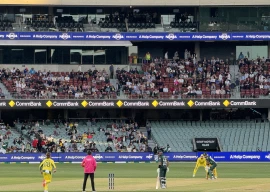
In almost four years in power, the PPP-led coalition has failed in steering the ship of state to calm waters on the economic front. And the iceberg lies right in the path of Pakistan’s rudderless economy. The only question on which economic analysts are divided is whether Pakistan has already hit the iceberg and is sinking, or whether there is still a slim window of opportunity to steer clear of the iceberg.
The figures look unhealthy enough to be in intensive care. Since the PPP-led government took charge, economic growth has been on the decline and both domestic and international debt is mounting. Domestic borrowing by the government in the past three-and-a-half years is almost equal to the combined borrowing by previous governments in the past 60 years. International debt obligations are automatically increasing as the rupee depreciates against the US dollar.
Selective indicators
But the government disagrees. Fauzia Wahab, an MNA from the PPP who also serves as the chair of the National Assembly’s Finance Committee, says many economic indicators of the country are positive, citing forex reserves of nearly $18 billion and exports worth more than $25 billion in the last fiscal year.
The real problem, she says, is the deficit between total revenue collection and money to run the government. “We require Rs4 trillion to run the state and income is Rs2.6 trillion,” she says.
“The ship is sinking,” says Dr Ashfaque H Khan, currently dean and professor at the National University of Science and Technology. “The government has not focused on the economy from day one. To counter political instability, all the government’s energies went into staying in power,” he says.
Federal Minister for Petroleum Naveed Qamar, who has also served as the finance minister, believes that the economy is not as weak as portrayed by critics. “It depends on the figures you look at”, he says.
He agrees that Pakistan’s economic growth figures are down but points out macro indicators, such as remittances and exports, are at a high.
Jobless and resentful
Former finance minister Dr Salman Shah, meanwhile, argues that Pakistan needs to accelerate growth to create jobs for roughly three million young people entering the job market every year. “We need eight to 10 per cent growth every year otherwise unemployment will become uncontrollable,” says Shah.
The corollary to high unemployment is social and political tension, in a country already brimming with resentment at high food prices, insecurity and shortages of gas and electricity. Across the country, there are strikes every week by different groups of people, ranging from medical professionals to small urban traders. And the cash-strapped government has done little to curb ostentatious lifestyles of its leaders or bringing in efficient management to control and restructure hemorrhaging public sector enterprises like the PIA, Pakistan Steel and Pakistan Railways amongst others.
Instead, aggressive histrionics by PPP leaders on Pakistani television talk-shows dominate the political and social discourse in the country. There is lots of fire but little substance.
Politics, at the cost of economics
Dr Khan blames the media. “The media also ignores economic issues as do politicians,” he says. Consequently, while issues like Memogate and President Zardari’s sudden departure for Dubai for an unspecified health problem dominate the airwaves, excessive government borrowing is rarely discussed.
Mr Qamar agrees that domestic borrowing, initially from the State Bank of Pakistan, had an inflationary effect, but the government later switched to borrowing from commercial banks. He points out that the government borrowing has now stopped after Pakistan once again sought help from the IMF. The domestic loans can only be repaid once growth is generated, he says.
While there seems to be general consensus that the economy can still be turned around, Dr Khan claims that a turnaround under the present government is not possible. “This government has lost credibility with local and foreign investors,” he says.
“Pakistan is like a thoroughbred horse but this government can’t ride it. They are treating Pakistan like a mule,” says Shah.
The government is quick to reject the criticism. But it is crystal clear that the turnaround isn’t likely to happen any time soon.
Published in The Express Tribune, December 12th, 2011.
COMMENTS (5)
Comments are moderated and generally will be posted if they are on-topic and not abusive.
For more information, please see our Comments FAQ





1731062031-0/Express-Tribune--(5)1731062031-0-270x192.webp)
1731065030-0/Untitled-design-(26)1731065030-0-270x192.webp)


1731057827-0/Untitled-design-(25)1731057827-0-270x192.webp)
1731054442-0/BeFunk_§_]-(53)1731054442-0.jpg)






@Meekal Ahmed:
Salman Shah and Dr. Ashfaque are renowned economists. Being 'unrepentant apologists' of the previous government does not, in any way, overshadow the work they have done.
Agree
Meekal sb, I highly respect your columns and would like to hear more from you. I am not quoting the figures as my own opinion, They are clearly attributed to the two PPP politicians whom I cite in the article. My own assessment is in the 2nd and 3rd paragraphs. I remain deeply worried about the economic situation as do you and all others who are watching the scenario. I agree that VAT will be forced upon Pakistan by IMF and its impact will be horrendous on people on fixed incomes. Because of space constraints, I could not go into details. Look forward to hearing from you. Regards
@ Meekal Ahmed Please provide the real, unflattering clear picture of economy. People need to hear the truth
Madam,
There can be no turn-around unless there is a change of course. It must be prompt and forceful.
However, with elections looming, I am not optimistic.
The present economic team has embarrassed the economic profession. It is their statutory and moral duty to tell it like it is or leave. Like Tareen, Salim Reza and Shahid Kardar did before them.
Go, relax and live in the Caymen Islands.
I don't know what figures you are quoting about reserves and exports. That is history now. Exports are faltering as world prices return to more "normal" levels and reserves are falling while imports rise at a fast clip. Since there is not much capital inflow, reserves will continue to fall until we run out (again) and have no option but to turn to the IMF to bail us out.
When our reserves are near-exhaustion and we are near-default, no one else will lend to us -- not even the Chinese or the Saudi's.
However, since memories in the IMF are not short, they will put us through the ringer this time, starting with a VAT as an up-front "prior action".
We may again be able to bluff our way and take their money and not do anything. But I would not count on it.
May I nevertheless urge you to broaden the sources you speak to? Both Salmaan Shah and Ashfaq are unrepentant apologists of the previous government.
If you would like some credible, non-involved and independent-minded sources, do get in touch.
Thank you.